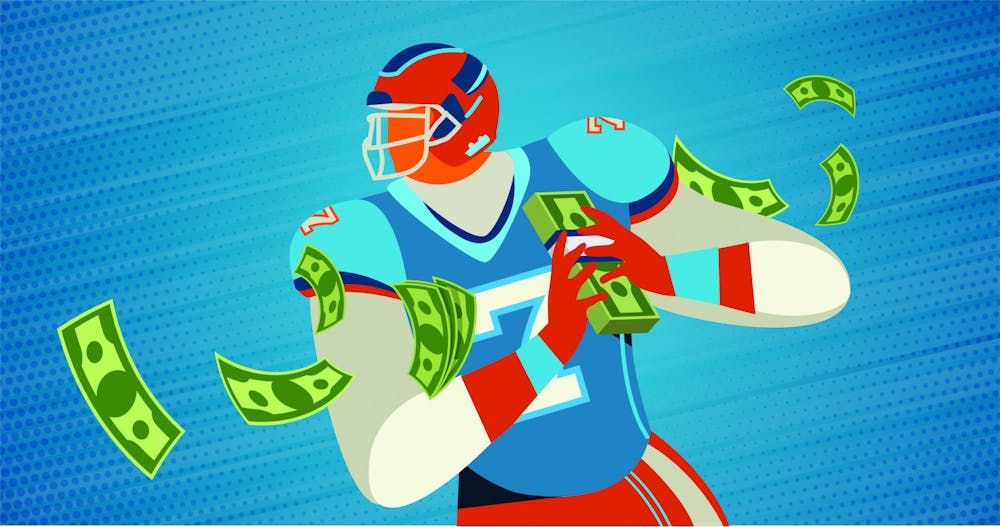College athletes are about to get paid.
In a league constructed around amateurism, that sounds illegal in some way. For most of history, it has been. That’ll all change in less than two months.
The name, image and likeness legislation, or NIL for short, will go into effect in Florida on July 1. The law will allow college athletes to receive compensation off just that: their name, image and likeness.
Schools and conferences still cannot pay athletes for their performances. However, athletes can now sign endorsement deals or profit off their own advertising deals. For example, the University of Florida won’t be able to pay quarterback Emory Jones to play for them in 2021, but if a local business wanted Jones to sponsor a sale, under the new legislation, Jones would be able to do so and earn money for the work.
Florida Gov. Ron DeSantis first signed the bill in June 2020, nearly nine months after California became the first state to do so. California’s bill won’t take effect until 2023, while DeSantis signed on to allow athletes to begin profiting on July 1, 2021. Since the bill was signed, Georgia, Alabama, New Mexico and Mississippi have passed similar legislation as the first wave of states to legalize student-athletes profiting off their appearance.
Florida attempted to delay the bill until July 2022 on April 29, but public outcry from players and coaches within the state forced an amendment to return the bill to its original start date by the next morning. Neil Schwartz, a longtime sports agent of roughly 30 years, said there’s significance in being the first states to accept endorsements for athletes, especially when recruiting prospects.
“You’re an athlete who’s thinking about either going to Texas or Florida or Georgia, and you’re hearing that the Florida athletes are making more money than the Texas athletes — where are you going?” Schwartz said.
Schwartz saw opportunity through the allowance of college-athlete compensation in the most modern form of communication of all: social media.
Schwartz co-founded a website called Jenloop, which allows fans to submit requests for social media posts from athletes for set prices. The website already features Pro Football Hall of Famer Terrell Davis, former Atlanta Falcon Roddy White and even CBS analyst Jason La Canfora. Florida linebacker Derek Wingo is already on the website, but he won’t be able to receive requests until after the July 1 deadline has passed.
Schwartz didn’t mince words about what collegiate stars missed out without this bill, especially the biggest names NCAA Football ever saw.
“Millions.” Schwartz said. “Trevor Lawrence and Tim Tebow, tens of millions.”
Former UGA punter Drew Butler, who now operates as the executive vice president of the collegiate division at Icon Source, sees the NIL legislation as something players both big and small can work to their benefit.
“You’re talking about kids from all over this country, where $100, $200, $250 can make a huge difference not only for them, but for their family back home,” Butler said. “On the other side of that, there will be opportunities that will be $250,000 and that’s really exciting as well.”Butler described Icon Source as a third-party, on-demand digital marketplace that offers athletes a place to advertise themselves, find the best marriage of brand and opportunity, and ensure none of their deals violate any new eligibility rules.
Butler echoed Schwartz’s sentiments about how NIL restrictions would affect new high school recruits. College coaches in states like Florida being able to highlight the extra dimension of financial support could prove the difference between keeping and losing a recruit.
“[Florida coach Dan] Mullen or [Florida State coach Mike] Norvell or [Miami coach Manny] Diaz can tell these recruits, ‘Hey, guess what? This fall, if you have five touchdowns in week one, your Icon Source could be popping off with opportunities and you can capitalize on what you do on the field at our university,’ that’s a huge added bonus,” Butler said.
Florida walk-on Clifford Taylor IV knows how to manage a social media following. The former tight end amassed over 319,000 followers between Twitter, Instagram and TikTok; a level of engagement potential endorsers look for.
Taylor, who played basketball in high school, proved through his social presence that there’s an avenue for athletes who aren’t five-star football prospects.
“My biggest thing is, be authentic,” Taylor said. “Don’t let this money you’re about to get change you … don’t change your brand for anybody, flesh out your personality. If you’ve got a good personality, if you’re a funny guy, let the world see that.”
Taylor said he was surprised the move to allow college athletes to profit didn’t become effective a year prior, especially after the movement to save college football seasons gained national momentum amid the COVID-19 pandemic. He said he was angry when the bill was delayed.
“To me, it was almost hypocritical, because they were finally addressing the fact that it’s time to pay the athletes what they’re worth, and then all of a sudden … they’re making them hold off for what they’re worth,” Taylor said.
Name, image and likeness laws are unlikely to remain a state-level issue for long, although it remains to be seen what a national law about NIL rights would look like. As many as six national bills have been introduced, including those by Florida Republican Senator Marco Rubio and the tandem of New Jersey Democratic Senator Cory Booker and Connecticut Democratic Senator Richard Blumenthal. A bipartisan bill offered by Representatives Anthony Gonzales (R-Ohio) and Emanuel Cleaver (D-Missouri) exists as well.
While both parties appear set to work toward national legislation allowing collegiate athletes to profit off their name, image and likeness, the two don’t necessarily see eye-to-eye on the vision of how such laws would be enacted.
Republican Senator Roger Wicker of Mississippi submitted a bill which would grant the NCAA both antitrust protections as well as the ability to limit different types of financial agreements. Booker and Blumenthal’s College Athlete Bill of Rights, however, proposed freedoms far beyond name, image and likeness, such as health and safety standards and improved education for athletes.
The idea of athletes being able to profit off their image and accept endorsements and sponsorships will change the landscape of sports forever, from recruiting to advertisements to even local businesses.
“What Uber did to the taxi industry, what Airbnb did to the hotel industry is what name, image and likeness is going to do to the NCAA,” Schwartz said.
For now, however, the clock continues to tick towards July 1 as recruits, agents and businesses around the country hold their breath in anticipation of the opening bell.
Contact Ryan Haley at rhaley@alligator.org and follow him on Twitter @ryan_dhaley

Ryan Haley, a UF journalism senior with a sports & media specialization from Jacksonville, Florida, is Summer 2022's Engagement Managing Editor. He grew up playing a bunch of different sports before settling on golf, following Rory McIlroy and all Philadelphia sports teams. He also loves all things fiction, reading, watching shows and movies and talking about whatever current story or character is in his head.






